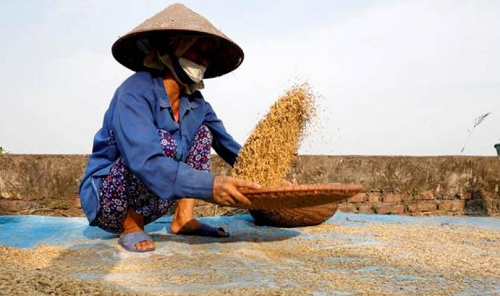Small farmers hit by weather issues will face even more hardship from coronavirus contagion. Courtesy Reuters
The resilience and food production capacity of small-scale farmers and families living in poverty is being tested to its limits by the current viral crisis. By Thin Lei Win and Michael Taylor (Thomson Reuters Foundation)
Rome, April 2020. With friends falling ill, some dying and his movements restricted, Giordano Alpi was already stretched physically and mentally when another disaster struck his 30-hectare farm in Emilia-Romagna, northern Italy.
A sudden plunge in night-time temperatures to below zero in late March caused extensive frost, damaging swathes of his fruit trees, including apricots, nectarines and peaches. This frost damaged up to 90% of fruit in Emilia-Romagna alone, with losses estimated at €130 million ($142 million). This was on top of the fast-spreading COVID-19 disease which had killed more than 13,100 people in Italy, the world's highest national death toll to date.
From Italy to India, Vietnam to Kenya, countries around the world are reeling from a double whammy of erratic weather - in many cases linked to climate change - and a deadly pandemic, both of which threaten lives and jobs.
"The tendency of these anomalies in the climate is growing," said Alpi, adding that the joint effect of climate extremes and coronavirus is making farmers “very worried (indeed) about these two phenomena."
"This is the new normal, absolutely,” said Christine Parthemore, a former adviser at the U.S. Department of Defense. “We're in a world of converging risks." Parthemore understands the situation; she worked as part of international efforts to contain West Africa's 2014-2016 Ebola outbreak and is now at the Washington-based Council on Strategic Risks. She pointed to Yemen, currently being hammered by war, disease, water scarcity and economic woes simultaneously, and Northern Nigeria where migration brought on by long-term drought is coinciding with attacks from Boko Haram militants.
"We should assume - as part of all of our planning and strategy - that you're not going to see threats manifest in isolation anymore," she added. This ‘new normal’ underlines that with even wealthy nations struggling to contain the coronavirus outbreak, experts fear the even greater harm it could do in places already beset by poverty, conflict and disasters.
The recent drought in Vietnam has brought hardship to many small farmers. Courtesy vnplus.
"I think we are just now going to be seeing COVID-19's impacts unfold in Africa and developing countries," said Christina Chan, climate resilience director at the World Resources Institute (WRI), a U.S.-based think-tank. “It is unfathomable how poor populations will manage and respond to the virus,” she asserted. And with epidemiologists predicting the coronavirus pandemic could last for months, Chan warned that Atlantic and Gulf island states are at risk both from the disease and the hurricane season that starts in June.
A similar scenario is already playing out in Vietnam, where the fertile Mekong Delta, famous for its rice and shrimp production, has battled severe drought and saltwater intrusion since late last year. Nearly 100,000 households face water shortages, about 40,000 hectares of cropland have been damaged with little sign of the crisis abating, according to the UN. Despite government schemes to provide water and sow rice earlier helping vulnerable farmers, the virus is now hiking pressure on scarce water resources as medical demands increase.
"The (Mekong) delta was under stress before COVID-19 came in,” said Caitlin Wiesen, the UN Development Programme representative in Vietnam. “There (is now) the issue of the lack of water for both food production ... as well as for personal consumption and hygiene," she said. Indeed, resurce experts have already flagged that the pandemic is likely to put stress on food production around the world. A recent UN paper said hunger and malnutrition levels were "already alarming" before the latest health crisis, which is "leading to instability in both local and global food markets, causing a disruption to food supply and availability".
University of Adelaide's Martin Cole, who chaired the UN report, spoke of potential disruption to farm labour and agricultural inputs like seeds at a critical time for planting. Although the immediate impact of COVID-19 has been in countries with a developed food supply chain and sophisticated health service, the big unknown is how this is going to impact less-developed regions, he added.
Traders affected by coronavirus implications offer oranges for sale in Nairobi. Courtesy Reuters/Njeri Mwang.
Agricultural experts note that the virus is threatening families who already have little to eat and get about half their food from informal traders and markets. And in East Africa, an invasion of desert locusts has also ravaged crops and decimated pasture, threatening the livelihoods of millions of people. And this could cause food prices to triple or quadruple. Which would have a devastating impact on the purchasing capacity of households in those regions.
All these issues are "threat multipliers" because of their ability to aggravate existing tensions and problems and cause far-reaching impacts. And while there is no direct connection between climate change and the new coronavirus, there is "clear evidence that climate change is likely to exacerbate and potentially increase the likelihood of pandemics around the world", warned US-based Center for Climate and Security.
Furthermore, there is no doubt that the fast-moving coronavirus was "upending civilization", but dealing with it should not mean ditching goals to tackle climate change. As Charles Iceland, WRI's director of water initiatives, pointed out: "COVID will come and go at some point... Climate change is going to be with us permanently.”
Thomson Reuters Foundation, the charitable arm of Thomson Reuters, covers the lives of people around the world who struggle to live freely or fairly. Visit http://news.trust.org


